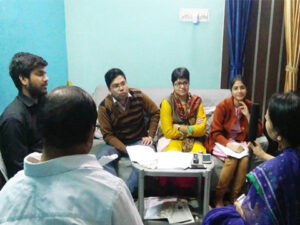A Case Study With Success

Mrs. Nirupa Sen, (The real name has been changed) – a 32 yrs old lady, a committed house wife, and an adorable mother was living happily in a suburb near Kolkata. Life was going almost without worry. She was quite engaged with her little family while nurturing her child and taking care of her spouse round the clock. She was quite satisfied with life and busy with building her dreams around her little son. Indeed it was a sweet home from many respects.
However, suddenly life has changed its course. Nirupa came to know that her husband is involved in an extramarital relationship. Soon she was started facing various difficulties and getting victimized on several counts. Mental torture becomes the norms of the day and communication gap intentionally created by her husband makes her totally helpless in a much-suffocated ambience. The victim irrespective of all these tried her best to adjust with the hope of a changed scenario while on the other side the increasing grinding made her believe that separation is the only way for herself and her child to survive and liberate from the toxic relationship. This dual mentality of victim led her in a dilemma to which she thought there’s no way out. To make things worse Nirupa’s life was totally confined at home. Her husband’s misbehavior made her feel shy to mix with others. She was absolutely disconnected from all of her friends,’ relatives, neighbors, and even was not welcomed in her maternal home. Moreover, our social system has created so many hurdles and barriers before women. If a girl wants to exhale her stress, wants to open her pain in front of people, our entire society will suppose to become very busy to find out the fault of the victim. Nirupa was also not an exception to that. Nirupa’s story is a vivid example of domestic violence. In India, most of the time perpetrators of this violence have been husbands. Around 31 % of married women have experienced physical, sexual, or emotional violence by their spouses. The most common type of spousal violence is physical violence (27%), followed by emotional violence (13%). Yet only 14% of women who experienced this violence sought help to stop it. The case of Nirupa was one of ‘Domestic violence and powerlessness’ which is about a woman being harassed mentally by her spouse and family where violence is a kind of abuse by one person against another in a domestic setting such as in marriage or cohabitation.
The team Activism with its systematic investigation, questionnaire, and three times interview found that the case Nirupa’s problem basically falls into two parts- one is structural and the other is functional. The structure here refers to the family of the victim, the accused, and its domestic violence and the functional aspect enlightens about the powerlessness of the victim and lessening of its functionality. The problem, however, is not only structural but also functional and hence the case is given the name of “Domestic Violence and Powerlessness”. Among the solution provided for the victim, one such was increasing of functionality which includes a strategy or way out to make changes in consistent with her purpose and goal effectively. The structural problem that is the domestic violence or say separation with the spouse which has been the solution as per victim could only be dealt well by increasing functionality and empowering oneself. As the victim was financially distressed and lacked control over herself, the structure remains ineffective. First and foremost, if the situation permits legal steps were asked to be taken in the form of FIR or by reporting to the Women’s Commission or by contacting West Bengal Legal Service Authority. Secondly, the victim was made aware of the behavior and reaction process as every action has no equal and opposite reaction in the social domain that intensifies the situation making it grave and was suggested for ‘everyday form of resistance’. Thirdly, a strategy or road map was encouraged to be made by the victim keeping her goals in mind by dissolving the dilemma and gaining self-confidence. Fourthly, financially several other measures were also suggested to her become economically self-reliant and capable along with keeping personal savings for the future. In this way, she could take decisions being less dependent on the spouse for monetary benefits. And lastly, as her communication with others was obstructed deliberately by her spouse, Activism also suggested her to rather increase networking and open up with others about her problems whom she considers reliable. The team Activism not in any way regards the victim’s spouse activity justifies but still suggested the victim to keep an eye on her reaction as well.
When life has knocked down her to its feet, Nirupa started to feel the reality. There is only one way to make oneself fit to any adverse situation, by increasing her functionality with a proper and effective strategy. After an effective interaction with Activism, Nirupa regained her confidence and believed that paths will be open when roads are blocked. She started to enjoy her life. Nirupa started a new chapter of her life with Activism and so with high ecstasy and joy she extended her heartfelt thanks and wishes to the team even after the six months of the final conversation. Team Activism took a step in this domain to understand the issue and help the victim out of a vicious stand and in this way a solid concrete effort is sought to make an impact of social science research in society through this platform.
Writer: Sumita Shaw
Editor(s): Indranil Paul, Soma Bhattacharya
Like Nirupa if you are in trouble or pain, please share it with us. Activism is always there to hold your hand and is ready to provide relentless effort to solve your problem through research.

